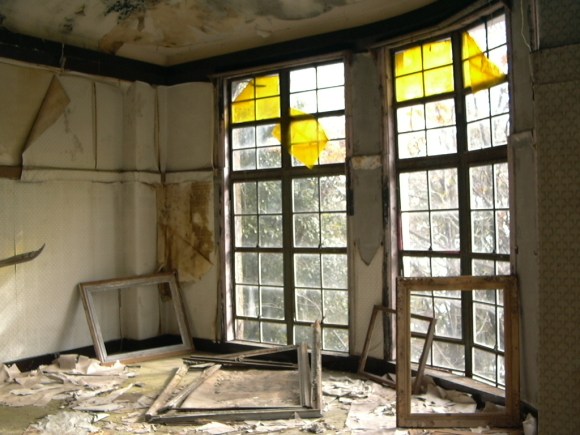
In Japan, places where people have died are considered bad luck, so unsurprisingly apartments where there has been a suicide, murder, or other death are rented at much cheaper prices than usual due to a lack of demand. However, real estate agencies are seeing a surge in people specifically seeking these kinds of ‘death rooms’. That may sound horribly morbid, but usually it’s not out of a desire to be close to death. Rather, for those who can put aside their culturally-ingrained reservations, it’s a way to save money during tough times.
- Incident buildings
Buildings where a death has occurred are called ‘jiko bukken‘ in Japanese or ‘incident buildings’, an ambiguous phrasing similar to the ‘jinshin jiko‘ or ‘human accident’ used when someone has jumped in front of a train.
People assume that there will be some damage to the room because of the corpse, but Chizuko, the owner of a real estate agency that deals exclusively with incident buildings, explained that ‘these days we have more advanced cleaning techniques, and after a while the smell and the stains will disappear.’ But it’s not just the nitty-gritty practical considerations that discourage Japanese people from living in such places – there is a cultural stigma which leads people to feel that the place is tainted and impure, and will invite unhappiness into the life of the next inhabitant. However, these days real estate agents are finding that people with less economic means are willing and even eager to live in these cheaper places.
- Tough times
A 40-year-old man, let’s call him Yamada, who used to work as a dispatch worker began living in his one-room apartment in June 2012. His apartment is located within Shinjuku ward in central Tokyo and is over 20 years old.
Yet for such a central area, his rent is astoundingly cheap at just 40,000 yen (US$391) per month, around half the local average. (Don’t even get me started on the average Tokyo rent!) The reason for this low rate is that the previous tenant was found dead in the room from illness. Yamada was aware of this when he moved in as in Japan there is a legal requirement to disclose any deaths that have occurred in the property within a certain time frame.
After graduating high school, Yamada worked part time at restaurants and call centers, and with various temping agencies, but after the collapse of the bubble economy his salary also nosedived from 4 million ($39,000) annually to around 2 million ($19,500). When searching for somewhere to live Yamada’s friend who worked as a real estate agent, and knew about his tough financial situation, suggested he specifically look for these ‘accident buildings’. His buddy told him that he had to move quickly if he found one of these buildings as they had become very popular, so he signed the contract right away. Yamada himself said ‘I’m not bothered by the previous tenant. I’m very satisfied with it as a place to live.” This is an attitude that is starting to become more prevalent, particularly among younger people.
- Gory details
It’s customary within the industry for incident buildings to be advertised for around half the average market rate for this area, and this precedent was set by the Urban Renaissance Agency (UR) which has around 750,000 rental properties around the country. Their incident properties are half the usual rent for the first one to two years, and as with UR’s other properties the rooms don’t require a deposit or a renewal fee. This is particularly appealing to those on housing benefits for whom the state subsidizes up to a certain amount of their rent. With the aging population there are unfortunately many cases of older people dying alone in their houses, so there are also an increasing number of these cheaper properties to meet their needs.
According to Mr. Morita, a lawyer specializing in real estate, there is a legal obligation to notify the renter or buyer 5 to 7 years after the accident (although there are now ways to find out if someone has died in your room even after the legal time frame is up). UR goes so far as to include the date the tenant died, the date the body was found, their age and gender, and what kind of incident it was. And yet even with all those gory details they still have enough demand so that ‘around half of rooms are filled within one month of advertising’. Incidentally, it can be vital to the fate of a property whether a person is declared dead at the scene, or in the ambulance or hospital. It’s only if they are pronounced to have died in the room that the owner is legally obliged to disclose the death.
- Social problems
A reason for why so many people who are hard up economically are so eager to move into these undesirable rooms is due to a lack of social housing for low income households. As of 2011 there were 2.2 million properties in the scheme, but this was barely any change from 2003. When asked about why so little new social housing had been created over the last eight years, the Ministry of Land, Infrastructure, Transport and Tourism responded that ‘many buildings that were erected during the high growth period are being replaced. Local governments are having financial difficulties, and they have not got around to building new buildings.’ There are also fears for the future regarding the effect of the Olympics, which could see older wooden apartments in central Tokyo being demolished, driving low earners out of the city and even further from the jobs.
—
In modern Japan, the certainty of cheap rent and a place to live today wins out against the chance of possible karmic repercussions in the future. So, dear readers, would you be comfortable with living in an ‘incident building’? Would the cheaper rent be enough to offset the knowledge that someone had died in that room, possibly right under where you’d put your bed? Do you believe that a room where someone has died will bring bad luck, or does it make no difference as long as all traces of death have been bleached away?
Source: Yahoo! Japan
Image: Wikimedia Commons

 What to do if you want to lower your apartment rent or avoid paying key money in Japan
What to do if you want to lower your apartment rent or avoid paying key money in Japan House hunting? Here are some tips that might prevent headaches and frustrations
House hunting? Here are some tips that might prevent headaches and frustrations Japan has a cat real estate agency, where every apartment lets you and your kitty live together!
Japan has a cat real estate agency, where every apartment lets you and your kitty live together! Open-air toilets, showers for every room among offerings from crazy Tokyo apartment agency
Open-air toilets, showers for every room among offerings from crazy Tokyo apartment agency China’s ‘Rent-a-Foreigner’ industry is booming
China’s ‘Rent-a-Foreigner’ industry is booming Foreigner’s request for help in Tokyo makes us sad for the state of society
Foreigner’s request for help in Tokyo makes us sad for the state of society Mikado Coffee is a 76-year-old coffee chain with a major celebrity connection
Mikado Coffee is a 76-year-old coffee chain with a major celebrity connection Seaside scenery, history, and so many desserts on Yokohama’s Akai Kutsu【Japan Loop Buses】
Seaside scenery, history, and so many desserts on Yokohama’s Akai Kutsu【Japan Loop Buses】 Do Hi-Chew-flavor Hi-Chews have a reason to exist?【Taste test】
Do Hi-Chew-flavor Hi-Chews have a reason to exist?【Taste test】 Japan’s summertime towelket pillowcases are even better with the addition of Ghibli stars【Photos】
Japan’s summertime towelket pillowcases are even better with the addition of Ghibli stars【Photos】 Japanese convenience store fools us with its 40-percent-more sandwich, but in a good way
Japanese convenience store fools us with its 40-percent-more sandwich, but in a good way Randomly running into a great sushi lunch like this is one of the best things about eating in Tokyo
Randomly running into a great sushi lunch like this is one of the best things about eating in Tokyo Akihabara pop-up shop sells goods made by Japanese prison inmates
Akihabara pop-up shop sells goods made by Japanese prison inmates Japan’s lap-pillow ear-cleaning salons aren’t just for pervy guys, we find out
Japan’s lap-pillow ear-cleaning salons aren’t just for pervy guys, we find out Anime girl English teacher Ellen-sensei becomes VTuber/VVTUber and NFT
Anime girl English teacher Ellen-sensei becomes VTuber/VVTUber and NFT McDonald’s new Happy Meals offer up cute and practical Sanrio lifestyle goods
McDonald’s new Happy Meals offer up cute and practical Sanrio lifestyle goods Japanese ramen restaurants under pressure from new yen banknotes
Japanese ramen restaurants under pressure from new yen banknotes French Fries Bread in Tokyo’s Shibuya becomes a hit on social media
French Fries Bread in Tokyo’s Shibuya becomes a hit on social media Studio Ghibli releases new action figures featuring Nausicaä of the Valley of the Wind characters
Studio Ghibli releases new action figures featuring Nausicaä of the Valley of the Wind characters Red light district sushi restaurant in Tokyo shows us just how wrong we were about it
Red light district sushi restaurant in Tokyo shows us just how wrong we were about it New private rooms on Tokaido Shinkansen change the way we travel from Tokyo to Kyoto
New private rooms on Tokaido Shinkansen change the way we travel from Tokyo to Kyoto Tokyo Tsukiji fish market site to be redeveloped with 50,000-seat stadium, hotel, shopping center
Tokyo Tsukiji fish market site to be redeveloped with 50,000-seat stadium, hotel, shopping center Beautiful Ghibli sealing wax kits let you create accessories and elegant letter decorations【Pics】
Beautiful Ghibli sealing wax kits let you create accessories and elegant letter decorations【Pics】 Japanese city loses residents’ personal data, which was on paper being transported on a windy day
Japanese city loses residents’ personal data, which was on paper being transported on a windy day Studio Ghibli releases Kiki’s Delivery Service chocolate cake pouches in Japan
Studio Ghibli releases Kiki’s Delivery Service chocolate cake pouches in Japan New definition of “Japanese whiskey” goes into effect to prevent fakes from fooling overseas buyers
New definition of “Japanese whiskey” goes into effect to prevent fakes from fooling overseas buyers Our Japanese reporter visits Costco in the U.S., finds super American and very Japanese things
Our Japanese reporter visits Costco in the U.S., finds super American and very Japanese things All-you-can-drink Starbucks and amazing views part of Tokyo’s new 170 meter-high sky lounge
All-you-can-drink Starbucks and amazing views part of Tokyo’s new 170 meter-high sky lounge More foreign tourists than ever before in history visited Japan last month
More foreign tourists than ever before in history visited Japan last month New Pokémon cakes let you eat your way through Pikachu and all the Eevee evolutions
New Pokémon cakes let you eat your way through Pikachu and all the Eevee evolutions Disney princesses get official manga makeovers for Manga Princess Cafe opening in Tokyo
Disney princesses get official manga makeovers for Manga Princess Cafe opening in Tokyo Sales of Japan’s most convenient train ticket/shopping payment cards suspended indefinitely
Sales of Japan’s most convenient train ticket/shopping payment cards suspended indefinitely Sold-out Studio Ghibli desktop humidifiers are back so Totoro can help you through the dry season
Sold-out Studio Ghibli desktop humidifiers are back so Totoro can help you through the dry season Japanese government to make first change to romanization spelling rules since the 1950s
Japanese government to make first change to romanization spelling rules since the 1950s Ghibli founders Toshio Suzuki and Hayao Miyazaki contribute to Japanese whisky Totoro label design
Ghibli founders Toshio Suzuki and Hayao Miyazaki contribute to Japanese whisky Totoro label design Doraemon found buried at sea as scene from 1993 anime becomes real life【Photos】
Doraemon found buried at sea as scene from 1993 anime becomes real life【Photos】 Tokyo’s most famous Starbucks is closed
Tokyo’s most famous Starbucks is closed One Piece characters’ nationalities revealed, but fans have mixed opinions
One Piece characters’ nationalities revealed, but fans have mixed opinions We asked a Uniqlo employee what four things we should buy and their suggestions didn’t disappoint
We asked a Uniqlo employee what four things we should buy and their suggestions didn’t disappoint Princesses, fruits, and blacksmiths: Study reveals the 30 most unusual family names in Japan
Princesses, fruits, and blacksmiths: Study reveals the 30 most unusual family names in Japan These apartments are crazy-small even by Tokyo standards, and super-popular with young people
These apartments are crazy-small even by Tokyo standards, and super-popular with young people Bored with hotels? Abenomics bringing new lodging options for foreign tourists in Japan
Bored with hotels? Abenomics bringing new lodging options for foreign tourists in Japan Crazy-cheap Japanese apartment for less than 140 bucks a month comes with headaches every day
Crazy-cheap Japanese apartment for less than 140 bucks a month comes with headaches every day How much money do you need for a studio apartment in downtown Tokyo?
How much money do you need for a studio apartment in downtown Tokyo? You could be renting this 300-year-old samurai era house in Japan right now
You could be renting this 300-year-old samurai era house in Japan right now Super cheap apartment in Japan has a steamy past, free water
Super cheap apartment in Japan has a steamy past, free water This Tokyo apartment complex lets you paint your room, offers community BBQ and camping gear
This Tokyo apartment complex lets you paint your room, offers community BBQ and camping gear The price of newly built apartments in central Tokyo skyrocketed over 100 million yen last year
The price of newly built apartments in central Tokyo skyrocketed over 100 million yen last year Japanese organization wants stricter regulations against people smoking on their own balconies
Japanese organization wants stricter regulations against people smoking on their own balconies Apartments with no bath or shower rising in popularity among young Tokyoites, report says
Apartments with no bath or shower rising in popularity among young Tokyoites, report says Real-life Evangelion apartment in Japan is ultra-cheap, ultra-anime【Photos】
Real-life Evangelion apartment in Japan is ultra-cheap, ultra-anime【Photos】 Burger King opens a rental site to help fast food lovers find an apartment in Japan
Burger King opens a rental site to help fast food lovers find an apartment in Japan Tokyo real estate agency sends beautiful women with you on apartment visits for date-like mood
Tokyo real estate agency sends beautiful women with you on apartment visits for date-like mood Moving to Tokyo? Here are the three best, most reasonable neighborhoods to live in
Moving to Tokyo? Here are the three best, most reasonable neighborhoods to live in Ikea Japan offering fully furnished apartment to rent for less than a dollar a month
Ikea Japan offering fully furnished apartment to rent for less than a dollar a month
Leave a Reply